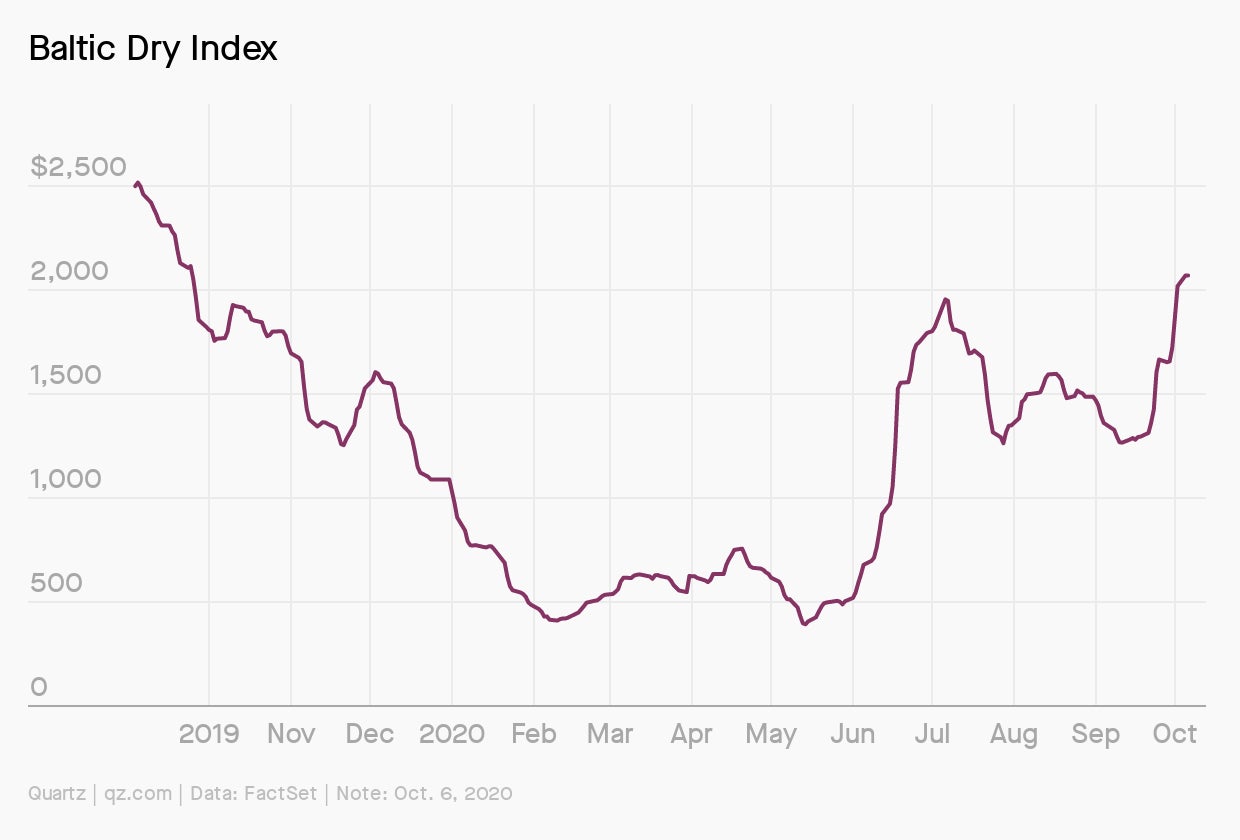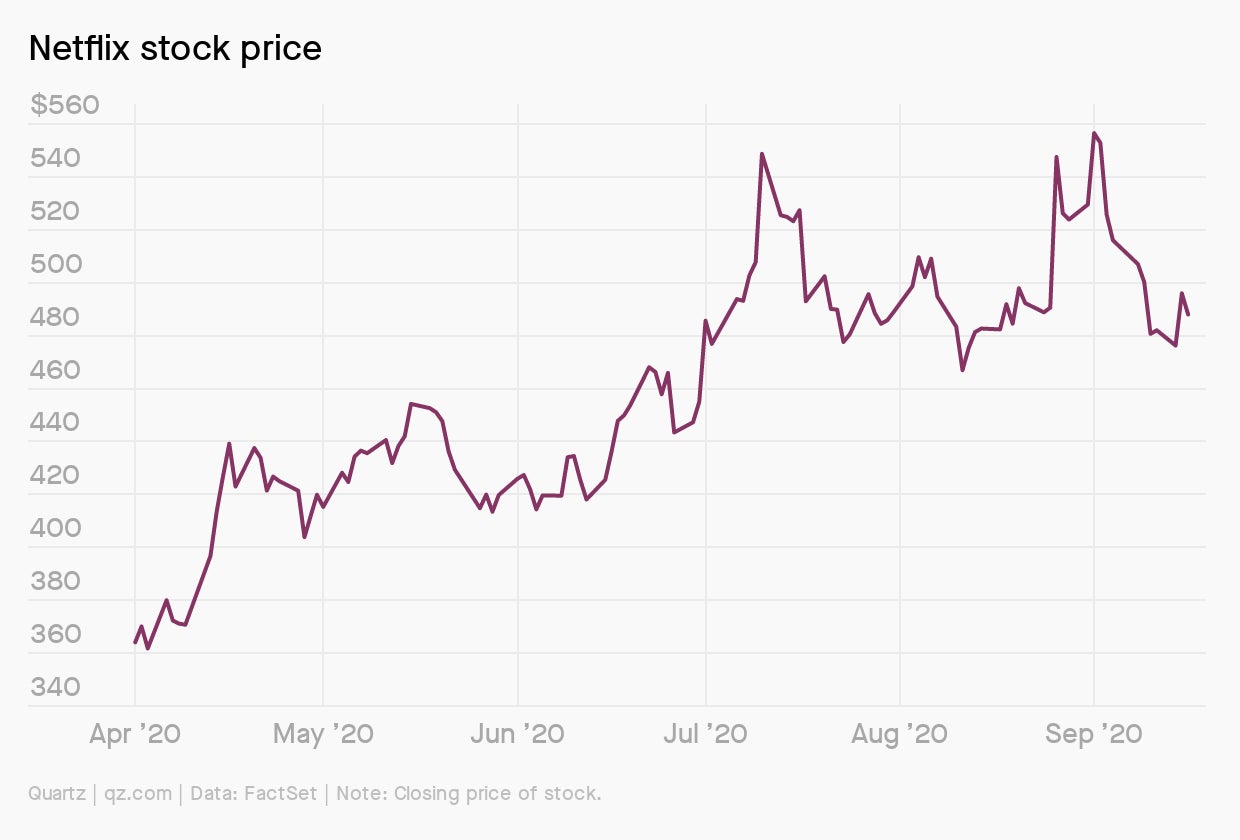AstraZeneca’s back at it, H-1B visa changes, comic cons
Good morning, Quartz readers!

Good morning, Quartz readers!
Here’s what you need to know
AstraZeneca is getting its vaccine back on track. Trials of the company’s joint effort with the University of Oxford and Serum Institute of India could resume later this year following a halt in testing. Eli Lilly, meanwhile, is looking for the fast track, asking the Food and Drug Administration for emergency authorization of a Covid-19 antibody treatment that could reduce hospitalizations.
US immigration pumps the brakes. Major new changes to the H-1B visa program that make it harder for foreign workers to come to the US go into effect today. The new policy narrows the types of eligible degrees, raises wages that H-1B workers should be paid, and shortens the length of visas for some contract workers.
A new type of jet is taking off… In a rare bright spot for the aviation industry, Boom Supersonic showed off its brand new XB-1 jet. When the first production model is complete, three General Electric-designed engines should push the 210-ft aircraft from New York to London in just 3.5 hours.
…just in time for a trip to Switzerland. With this year’s World Economic Forum delayed from January to May due to the pandemic, its organizers decided a change of scenery was also in order. Next year’s gathering will be held 125 miles away from Davos, its traditional location, in a resort overlooking Lake Lucerne.
Utah is also nice this time of year. It’s also the setting for today’s US vice presidential debate between vice president Mike Pence and senator Kamala Harris. With US president Donald Trump re-installed in the Oval Office, his No. 2 has 90 minutes to make the case for re-election.
Charting the Baltic Dry Index
If you’re not one to keep an eye on the BDI, now’s a good time to give a little attention to this number, which tracks the cost of shipping commodities like iron and coal. Right now, the index is the best illustration of how China is pouring cash into infrastructure, from green energy projects to electrical grids and airports, in an array of stimulus measures that are rippling through global financial markets.

China, of course, has been here before. John Detrixhe breaks down why the country’s spending spree matters.
The joy of indexing
From the number of hours people are working in different countries to changing company stock prices, it’s often necessary to compare numbers on very different scales. The key to doing this well is indexing. When data points are indexed, they are all compared to their level at some particular point time.
Consider stock market investing. Let’s say a friend, bored during the Covid-19 lockdown, decided to start buying stocks through mobile banking app Robinhood, figuring it would make for a fun way to kill time and learn a bit more about the stock market. One of the stocks he bought was Netflix. By mid-September he was quite pleased with himself. Since the beginning of April, when he purchased his shares, the stock price had jumped by 34% to $488, from $364.

How would you truly determine whether he made a good bet? As part of our guide to the data deluge, we wrote an explanation of why indexing is so essential and how you can do it yourself.
✦ We’ve checked the data, and it seems like a Quartz membership could be a good thing for you. Check it out.
Obsession Interlude: Because China
Not that long ago, it used to be pretty common to see overwhelmingly male names explaining developments in China in English-language articles. But a number of efforts have made the work of all sorts of women writing about China—including political scientists, novelists, and scientists—more visible. Here are a few whose work, and lives, bridge cultures:
Yangyang Cheng is a particle physicist, she writes deeply personal essays on being a US immigrant, her relationship with her mother in China, and her attempts to navigate the vast gulf between the value systems of both countries, often drawing on her scientific background.
Courtney Fung is an assistant professor of international relations at the University of Hong Kong, she is an expert on China’s influence in global governance. Count on her to point out, for example, instances of Beijing using international organizations to marginalize Taiwan.
Yan Ge became well known in China after winning awards at an American Idol-style writing competition. Now living in Ireland, Yan has shifted to writing in English—a switch that she says makes your personality “undergo a slight, or probably profound, change.”
Chencheng Zhang, who teaches politics and international relations at Queen’s University Belfast, is fascinated by questions of citizenship, migration and borders. In this essay, she dissects the rise of the phrase baizuo, or “white left,” on China’s internet.
We’re watching for small changes in China that will have outsize effects elsewhere. Stay up to date with our Because China obsession.
We’re obsessed with comic cons

All dressed up with nowhere to go. If the whole point of what are essentially days-long $300 glorified infomercials is seeing celebs, superheroes, and Cylons in the flesh, is a comic convention still a comic convention if no one shows up? With Star Wars sitting out of all of the online versions, Marvel taking over this week’s New York Comic-Con, and DC Comics hosting its own 24-hour online fan event, there’s no guarantee that these events—at least the ones that fans, vendors, and marketers would recognize—will win out over the villain that is Covid-19. Suit up. The Quartz Weekly Obsession has an industry to save.
You asked about plexiglass
Is plexiglass actually effective in stopping the spread of Covid-19?
The clear barriers are a common sight at many in-person transaction sites these days, including a US vice presidential debate. The partitions principally work by intercepting droplets emitted from someone’s mouth that might contain the virus. They’re also effective at “re-enforcing physical distancing requirements, even when users are unwilling or forgetful” according to Canada’s National Collaborating Centre for Environmental Health.
But physical barriers have their limitations, particularly within, say, a large empty arena in which two politicians are debating. The biggest is that the plexiglass panels could limit ventilation, reducing the air change rate in a given space. Alex Ossola breaks down some knowledge barriers.
Surprising discoveries
The truth is out there. A new interpretation of quantum mechanics holds out hope for the existence of objective reality.
Remote work is now an aesthetic. Cole Haan teamed up with Slack for a limited-edition sneaker collection that must have sounded good on paper.
Tasmanian devils give Oz another spin. With a little help from Thor, the meat-eating marsupials returned to Australian forests for the first time in 3,000 years.
A name game could delay playtime for Indian gamers. A Delhi man reportedly trademarked the name “PS5” ahead of the launch of Sony’s Playstation 5.
There’s such a thing as too much product-market fit. Security flaws in a high-tech chastity belt for men could leave users connected and contained for longer than they might like.
Our best wishes for a productive day. Please send any news, comments, work-themed sneakers, and objective realities to [email protected]. Get the most out of Quartz by downloading our iOS app and becoming a member. Today’s Daily Brief was brought to you by Susan Howson, John Detrixhe, Alex Ossola, Tripti Lahiri, Mary Hui, and Max Lockie.